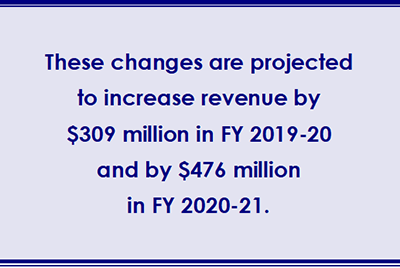News from State Controller Betty Yee
Sacramento, CA: On June 21, 2018, the United States Supreme Court ruled a state can require businesses without a physical presence in that state to collect and remit sales taxes on in-state transactions if the business has a substantial nexus.
In its 5-4 decision in South Dakota v. Wayfair (Wayfair), the Supreme Court ruled a nexus may be based on both economic and virtual contacts, and the amount of in-state economic activity required by South Dakota law — more than 200 transactions or $100,000 in in-state sales — satisfies the substantial nexus requirement established in Complete Auto Transit v. Brady (1977).
In response to the Wayfair decision, the California Department of Tax and Fee Administration (CDTFA) issued a notice in December 2018 using the same standards as the South Dakota statute. Under the notice, retailers with sales of more than $100,000 in California in the current or previous calendar year, or who entered into 200 or more transactions in the state in that timeframe, were required to register as retailers with CDTFA and collect and remit the use tax effective April 1, 2019.

However, the California Legislature in April 2019 sought to limit economic nexus for California use tax purposes. Assembly Bill 147 (Chapter 5, Statutes of 2019) amended Revenue and Taxation Code (RTC) section 6203 to require that retailers located outside of California (remote sellers) register with CDTFA and collect California use tax only if, during the preceding or current calendar year, total combined sales of tangible personal property for delivery in California by the retailer and all related persons exceeds $500,000. This economic nexus with California took effect April 1 and does not include a transactions threshold.
The new law also amended RTC section 7262 to require all retailers, whether located inside or outside of California, to collect district use tax on all sales made for delivery in any district that imposes such a tax if, during the preceding or current calendar year, the total combined sales of tangible personal property in – or for delivery in – California by the retailer and all related persons exceeds $500,000. This new collection requirement took effect April 25.
As of October 1, the Marketplace Facilitator Act created by AB 147 and amended by Senate Bill 92 (Chapter 34, Statutes of 2019) provides that a marketplace facilitator is responsible for collecting and paying tax on retail sales made through their marketplace for delivery to California customers. A marketplace includes a physical or online site where tangible merchandise is sold for delivery in California. A marketplace facilitator generally is the operator.
These changes are projected to increase revenue by $309 million in Fiscal Year 2019-20 and $476 million in FY 2020-21.
